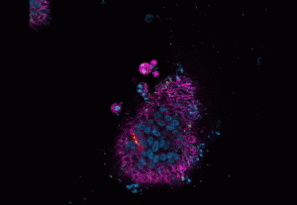Undiagnosed Diseases Center to address rare genetic cases
Baylor College of Medicine has formed a new center to evaluate patients with rare genetic conditions. The Undiagnosed Diseases Center (UDC) continues the work of Baylor’s Undiagnosed Diseases Network (UDN) clinical site, DNA sequencing core and model organisms screening center.
A multidisciplinary team of Baylor faculty will provide clinical services and genetic testing and analysis to assess patients who have not received a diagnosis for their condition.

The UDN is a research study funded by the National Institutes of Health Common Fund aimed at bringing together clinical and research experts from across the United States to solve the most challenging medical mysteries using advanced technologies. Although NIH Common Fund support of the UDN as it existed is ending, clinical sites across the country, including Baylor’s site, will continue to provide services to existing UDN patients. New patients with rare, undiagnosed conditions may still be referred to Baylor’s center through the UDN central coordinating center or they can be referred directly to the center via the Baylor UDC website.

“The NIH Undiagnosed Diseases Network Clinical Site, National Sequencing Core and Model Organism Screening Center at Baylor and Texas Children’s Hospital have been enormously successful in making new diagnoses in patients who have had long diagnostic odysseys,” said Dr. Brendan Lee, director of the center, professor and chair of the Department of Molecular and Human Genetics, and Robert and Janice McNair Endowed Chair in Molecular and Human Genetics at Baylor. “We have also made important new scientific discoveries that have more broadly impacted medicine and science.”
The Undiagnosed Diseases Center at Baylor and Texas Children’s builds on the success of the UDN by continuing its previous work while also expanding its focus to unusually severe presentation of diseases that may suggest a strong genetic contribution.

Baylor also will expand services to patients outside the UDN through its Consultagene platform, an online portal that provides educational resources and genetics services. Patients can apply directly or be referred by their physician. Physicians also can connect with Baylor faculty directly for a consultation on their cases. Consultagene offers options for telehealth appointments, which may eliminate the need for some patients to travel to Houston for clinic visits and genetic testing. Alternatively, after review by the UDC, additional clinical workup may be recommended either at their local provider or via referral to adult and pediatric specialties at Baylor Medicine and Texas Children’s Hospital, respectively.
“At Baylor, we have a multidisciplinary team that has experience working together to solve these difficult cases,” said Jill Mokry, center coordinator and associate professor of molecular and human genetics at Baylor.
It’s possible that a person is undiagnosed because the condition isn’t yet discovered by medicine. We have the genetic expertise and access to research tools that might help us make that discovery,” Morky said.
Find information for patients on how to apply here.
Find information for providers on how to request a consultation or refer a patient here.



